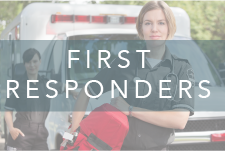How to Deal Covid-19 Aftermath on First Responders
- Jan 1, 2022
- 6 min read
Updated: Oct 31, 2025

The COVID-19 pandemic has had a profound and lasting impact on first responders, affecting their mental and physical well-being long after the peak of the crisis. These frontline heroes faced unprecedented challenges, from constant exposure to the virus to working extended hours in a state of hyper-vigilance. We understand the unique struggles they've faced and the long-term consequences that are still unfolding.
What are the lasting effects of COVID-19 on first responders?
First responders are experiencing significant and lasting physical and emotional tolls from the pandemic. This includes sustained mental fatigue, anxiety, and depression from prolonged hyper-vigilance, as well as an increased risk of addiction and traumatic stress.
Explore how the unrelenting "alarm response" has taken a toll on first responders and discover the vital steps that can be taken to support their mental health and well-being. Continue reading to learn more about the challenges they face and how to deal with the COVID-19 aftermath on first responders.
Dealing With the Aftermath
COVID-19 has dictated much of everyday life in the United States since its onset in early 2020. This includes school and store closings, social distancing guidelines, and even impacting the options available to get out of the house.
However, these effects pale in comparison to those who have suffered from the virus directly and battled its life-threatening symptoms, with entire lives and families being forever affected. Discussions around First Responders COVID Lasting Effects have also brought deeper attention to just how far-reaching the consequences of the pandemic truly are.
While the omnipresent threat of COVID-19 can feel overwhelming, this notion is even more extreme for those on the front lines – the first responders tasked with helping others in life-threatening conditions amidst an unprecedented pandemic. For many of them, the First Responders COVID Lasting Effects continue to impact both their physical health and mental well-being long after the peak of the crisis.
The Unique Effects of COVID-19 on First Responders
For first responders, especially EMTs or others in the medical field, increased hours, consistent emergencies, and an overabundance of misinformation pollute everyday life on the job. All of which adds to an already stressful, anxiety-inducing career field.
Being tasked with responding to emergencies involving anyone in their community means that EMTs, police, firefighters, and other first responders always need to be vigilant of coming into contact with such a contagious, life-threatening virus. Having to monitor themselves for any symptoms and being cognizant of potential exposures as they are asked to return to the field every day is incredibly difficult.
First responders not only regularly question their health, but also account for risks involved with going home to one's family after a day in the field. They may worry that they are exposing their loved ones to the very same infection that is threatening and complicating the lives of everyone else in the community.

The Strains of an Overtaxed “Alarm Response”
First responders have been heavily operating in an “alarm response” since the beginning of this pandemic era – a state of hyper-vigilance that dictates everything from one's procedures in the field to one's mentality.
This alarm response is emotionally exhausting and is a state of mind intended to be employed while coping with emergencies in the moment. Unfortunately, COVID-19 has forced first responders to maintain this same level of hyper-vigilance for the past two years and counting, taking an immense physical and emotional toll on individuals.
This sustained state of mind not only brings intense physical and emotional fatigue, but the continued effects of the coronavirus have left little time for first responders to consider how their own mental and emotional health has been impacted over the past two years. Extended hours have become common and first responders are still tasked with tending to the emergencies, needs, and protection of their communities.
First responders have been pushing down their personal needs more and more, even though they need more time for physical and emotional respite. Additionally, there is still no guarantee of an end in sight, especially with the emergence of the recent Omicron variant. First responders will likely be asked to continue maintaining this self-sacrificial persona.
Anxieties Continue to Mount
As the effects of COVID-19 continue, so too do the stresses, traumas, depression, and anxiety that first responders cope with every day. This creates a palpable fear of how it will impact them when COVID-19 eventually dies down and the extent of the life-changing effects on their mental health is realized. This realization can even come with a degree of shock and further anxiety.
Addressing the effects of COVID-19 on first responders is a dialogue that needs to happen, as building anxieties, traumatic experiences, depression, and fatigue will continue to compromise one's mental health. This can lead to more rash decision-making during high-stress scenarios or cause an individual to look to addictive substances to placate these feelings off the clock.
How to Deal with the COVID-19 Aftermath on First Responders
Even if the traumas and anxieties of the coronavirus are not immediately felt, they are building, and this constant mental state of emergency has a lasting impact on first responders as a whole. They may not grasp the long-term effects of this tumultuous time for years to come. Taking action to support first responders now is necessary.
For some, this can begin with voicing one's concerns to supervisors to open a dialogue, as it is probable that these feelings are universally affecting one's unit. Others may want to practice blackout times where they cannot be contacted or can choose not to expose themselves to news outlets that may remind one of their stresses. Self-care outlets at home and taking one's days off with family to create a time for emotional processing are all necessary.
There can be no way of knowing exactly how all of these notions will come to a head. However, first responders have been tasked with masking their emotional and physical fatigue to protect their communities for a truly inhuman amount of time. Finding dedicated programs or support groups for first responders can help break down this mask and process the astronomical stresses and expectations placed on them.
Getting groups of peers together as early as possible can help process these emotions with safety and support for when the traumas and stresses of the past two years surface. Furthermore, when the alarm response that has consistently dictated their mind and body is finally released and the realization of one's emotional turmoil sets in, help can be available.
Frequently Asked Questions
• What are some of the unique effects of COVID-19 on first responders?
First responders have faced increased hours, constant emergencies, and an overabundance of misinformation, all of which adds to an already stressful career. They also have to worry about exposing their families to the virus after a day on the job.
• What is the "alarm response" and how has it affected first responders?
The "alarm response" is a state of hyper-vigilance that first responders have been forced to maintain throughout the pandemic. This has caused intense physical and emotional fatigue, as this state of mind is not meant to be sustained for such a long period.
• How has the pandemic impacted the mental health of first responders?
The ongoing effects of the pandemic have caused an increase in stress, trauma, depression, and anxiety among first responders. They often push down their personal needs, which can lead to rash decision-making or substance abuse.
• What are some ways first responders can cope with the aftermath of the pandemic?
First responders can voice their concerns to supervisors, practice blackout times to disconnect from work, or use days off for self-care and emotional processing with family.
• Why is it important to address these issues now?
The traumas and anxieties from the pandemic are building, and their long-term effects on first responders may not be fully realized for years. Taking action now, such as through support groups, can help them process their emotions and prepare for when the full extent of their emotional turmoil sets in.
After all that first responders have given to their communities, we at Chateau Health and Wellness Treatment Center believe it is our turn to support them. We understand the immense weight and responsibility they carry, and we are committed to providing a safe, understanding space to help process the lasting effects of the COVID-19 pandemic. Our dedicated programs and support groups are designed specifically to address the unique challenges faced by first responders, allowing them to finally release the "alarm response" and begin their journey toward healing. We encourage you to reach out to us today at (435) 222-5225 so we can begin this important work together.

About The Author
Ben Pearson, LCSW - Clinical Director
With 19 years of experience, Ben Pearson specializes in adolescent and family therapy, de-escalation, and high-risk interventions. As a former Clinical Director of an intensive outpatient program, he played a key role in clinical interventions and group therapy. With 15+ years in wilderness treatment and over a decade as a clinician, Ben has helped countless individuals and families navigate mental health and recovery challenges.







